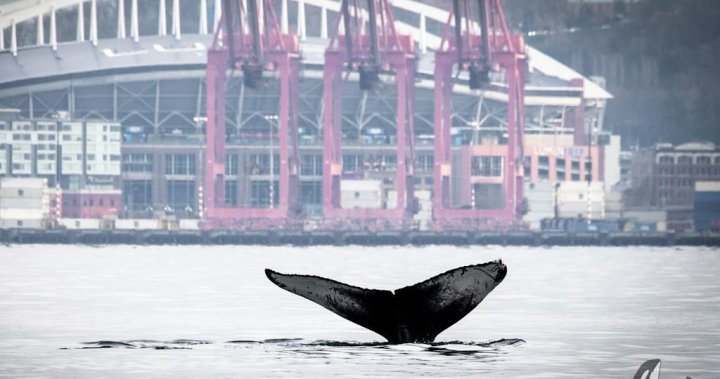A massive new international study is raising concerns about the effect of warming oceans on the health of humpback whale populations.
The study found a 20-per cent drop in the population of North Pacific humpback whales between 2012 and 2022 appears to be linked to the 2014-2016 marine heat wave known as “the blob.”
“It’s just yet another indicator of our impacts as humans and that we do need to understand we are having ecosystem-level changes … from the bottom of the ecosystem all the way up to these large marine mammals,” said Karina Dracott, senior North Coast specialist with Oceanwise.
Forty-six organizations, including seven in B.C., along with more than 4,000 citizen scientists contributed to the study, believed to be the largest-ever photo-identification dataset assembled for a species of cetacean.
The study, published recently in the journal Royal Society Open Science, found an estimated 33,500 humpbacks in the North Pacific in 2012, with a population growing nearly six per cent per year since 2002.
Breaking news from Canada and around the world
sent to your email, as it happens.
Breaking news from Canada and around the world
sent to your email, as it happens.
That marked a significant recovery for the species, which was reduced to critical levels before commercial hunting was banned in 1976.
From 2012 to 2021, however, the study found an estimated population decline of nearly 7,000 whales, likely linked to the heat wave.
“When you throw a wrench in like a big patch of warm water that affects the lowest levels of the marine food chain, which are really the crucial parts of the food chain, so when phytoplankton gets affected it just creates a cascade of effects all the way up to these really visible marine megafauna like humpback whales,” explained Tasli Shaw, co-founder of Humpback Whales of the Salish Sea.
“If they don’t have enough to eat their reproductive success goes down and they potentially shift what they are doing and where they are doing it.”

Humpback researcher Jackie Hildering with the Canadian Pacific Humpback Collaborative said the study was unique in the way it drew on observations and data from across the Pacific, not just locally.
In B.C., much attention has been directed to the so-called “humpback comeback,” with increased sightings of the whales.
Hildering said the research shows how that increased presence may be a factor of whales moving from elsewhere, rather than a sign of a healthier population.
“It can be really tempting to think everything is fine, we’re seeing more humpbacks along the coast, but where are those shifting from?” she said.
“And as they shift as well, especially coming closer to where we humans are doing what we do, you are going to get an overlap between the whales, entanglement risk and collision risk.”

Hildering said that while the study points to the effects of the 2014 “blob” heat wave, it has potentially wider implications with climate change delivering more frequent marine heat waves of greater intensity.
That concern, added Shaw, is shared by Canadian federal officials.
The Committee on the Status of Endangered Wildlife in Canada listed the whales as a species of “special concern” in its 2022 assessment, in part because of concerns about marine heat waves, she said.
“So just in case anyone is looking for additional motivation to soften the impacts of climate change, here’s another one,” Hildering said.
“(We have a) second chance with these animals we used to kill directly, but there are still many ways to kill a whale.”
© 2024 Global News, a division of Corus Entertainment Inc.





